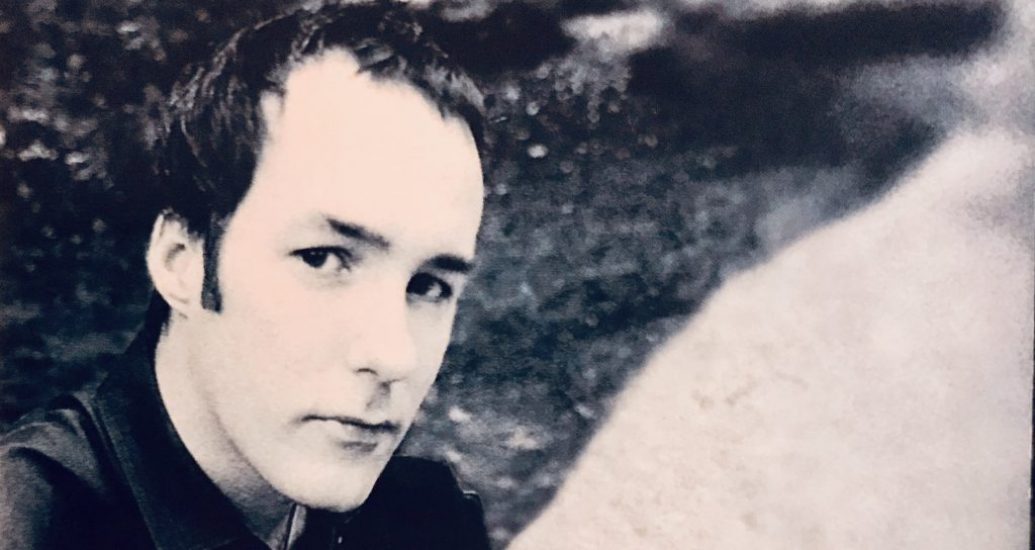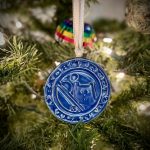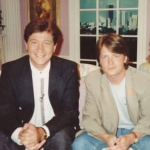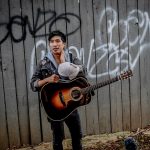‘Truly the Voice of an Angel’: Remembering Singer-Songwriter Richard Bicknell, 1959-2020
The first time I saw Richard was in the summer of 1988 onstage at the Little Five Points Pub. Having just fled a high school reunion, I was desperately in need of a sonic nightcap capable of removing the reunion’s Joe Cocker/Jennifer Warnes-laced soundtrack from my head. Bicknell’s band The Lost Angels, full of fiddle, accordion, torch and twang, fit the bill nicely.
While the roots rock and country act featured multiple vocalists and instrumentalists, your attention always shifted back to Bicknell, a willowy, whirling dervish center stage with gravity-defying jet-black hair, art school influenced wardrobe and a rich Southern gothic baritone. It was a voice that sounded like it originated somewhere down deep in the heels of his thrift store shoes and traveled North on I-185 straight out of Columbus, Georgia.
Whether that voice was paired with The Lost Angels, the singer’s subsequent groups, The Beautiful Losers, The Shameless Lovers or simply solo as Richard Bicknell, it was a voice that artfully encompassed the pain, the pathos and the pleasures of each person in the audience.
The Atlanta singer-songwriter, 61, died peacefully Monday night in his hometown at Columbus Hospice, surrounded by family, following an illness. Born on August 10, 1958 in Augsburg, Germany to Major Richard Bicknell and Mary Regina Bicknell, Richard graduated from Pacelli High in Columbus in 1977 and The Atlanta College of Art in 1984. He is survived by his parents, his sisters Mary Beth Cammon and Kathy Williams, his brothers Kevin Bicknell, Michael Bicknell and Scott Bicknell, his nephew Lyle Cammon and niece Mary Margaret Thompson and too many relatives, friends, bandmates and fans to list.
“Everyone talks about his voice but I always thought his songwriting was better,” says his brother, Michael Bicknell. “He had a painterly quality to his lyrics. A lot of impressionistic imagery that conjured scenes in your head.”
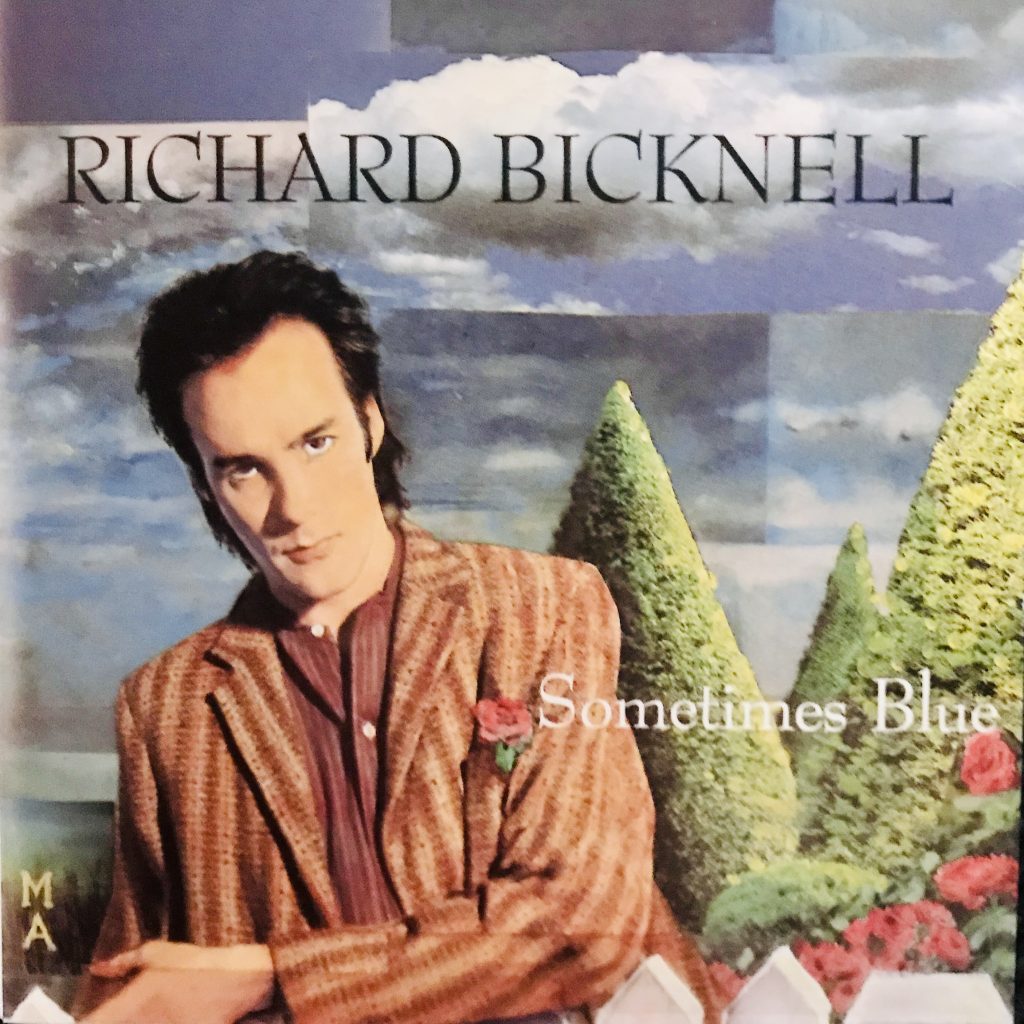
Post-Lost Angels, the singer’s solo career took off in the mid-1990s with his debut album “Sometimes Blue,” a project that featured a mix of originals, including the title track and “Wichita Rain,” along with songs from his songwriting heroes, including Nanci Griffith and David Olney.
In 1994, as a member of the Exocet recording studio family of musicians, Steve Boyes was originally brought in to cut some backing vocals for “Sometimes Blue.” He ended up playing guitar, becoming a songwriting collaborator and a permanent member of Bicknell’s band until 2014. “I moved to Georgia from Texas so I was very familiar with Richard’s influences — Townes [Van Zandt], Eric [Taylor], David Olney, and of course, Emmylou [Harris] so we already spoke a familiar language,” says Boyes. “But Richard was nothing like them. He would sing an entire song of incredible lyrics. Our job was to fill in the soundtrack to his movie. And unlike most writers, he didn’t follow a pattern…verse, chorus, verse, chorus, bridge, chorus, out. I used to joke that we never did anything the same way once, much less twice!”
“Richard truly had the voice of an angel,” recalled Victor Johnson, a guitarist and friend of the performer, on his Facebook page Tuesday. Johnson backed up the singer on acoustic guitar when Bicknell played a stripped down set at the Atlanta Pride festival in 1997.
By the time his second album “Mayflower” was released in 1998, intimate shows at Little Five Points Pub and The Point had given way to opportunities to open for Sir Elton John at Lakewood amphitheater in front of 16,000 fans. When I asked him if being in front of that many Elton John fans made him nervous, Richard just laughed and replied, “I’m more nervous playing The Freight Room in Decatur. You can see the faces in the audience there!”
Playing live with Bicknell had its share of creative challenges, recalls guitarist Steve Boyes: “Richard used to drive me crazy! He saw performance art! He’d want us to learn a new song during sound check by somebody I’d never heard of because he thought it would fit in the show perfectly. Meaning I had to know it and make sure everyone else knew it. But that’s how I got introduced to some great songwriters!”
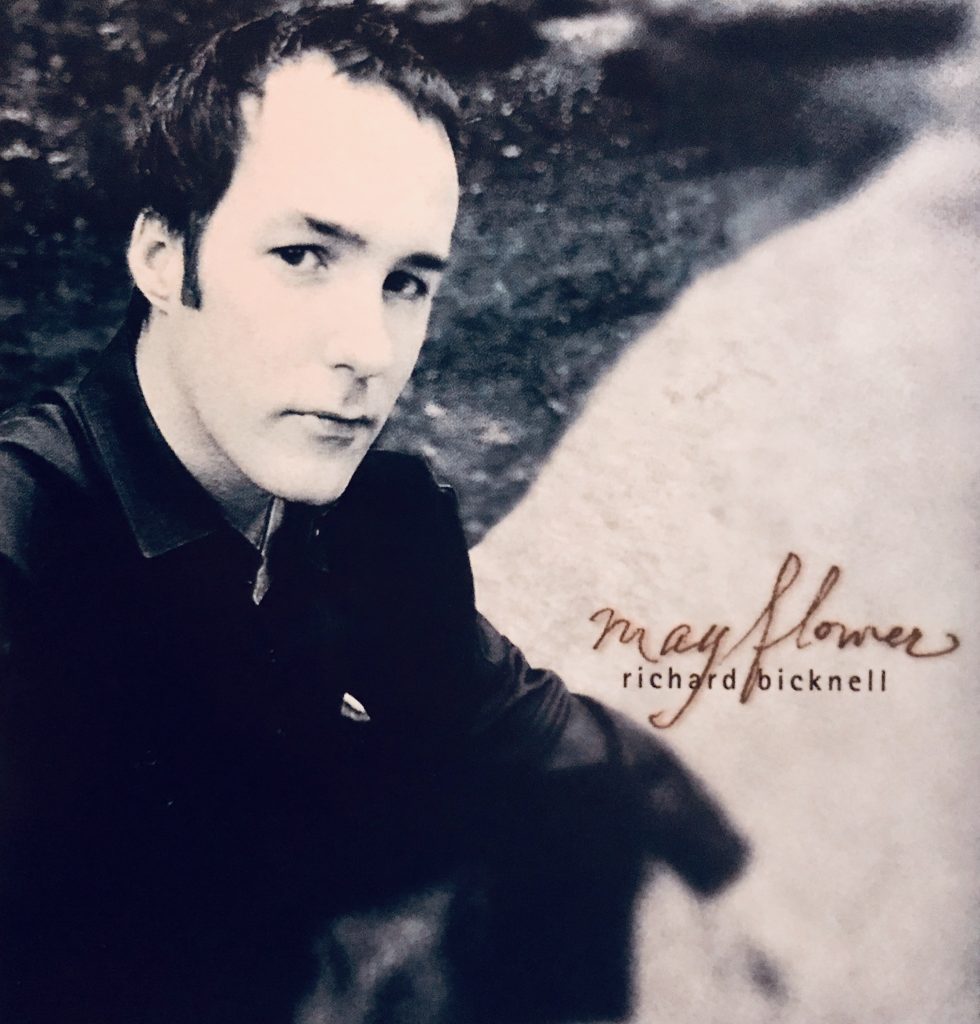
While the venues grew larger (by the time his third solo disc, “Baby Lightning’ came out in 2003, Bicknell was playing the Variety Playhouse) and the singer had scored a chance to open for his idol Emmylou Harris at the Roxy and perform with songwriting mentor David Olney on stage, Richard’s feet remained firmly planted in a back booth inside his favorite greasy spoon at 3 a.m.
In an AJC interview after opening for Harris, he quipped to me that his only remaining career goal was to get one of his songs onto the iconic Cheshire Bridge after-hours diner Dunk ‘n’ Dine (lovingly nicknamed the Drunk ‘n’ Dine by the city’s nightlife denizens). I ended up running the quote as the last line of my piece.
The next day, my phone rang in the Features Department. On the other end, was “Happy Herman” Mitchell, the proprietor of the diner. A week later, Bicknell’s album “Sometimes Blue” was on the Dunk ‘n’ Dine’s famed 2000-selection jukebox, nestled next to discs from his heroes Patsy Cline and Merle Haggard.
Later, crashed in a Dunk ‘n’ Dine booth listening to his album over a patty melt, fries and brown gravy, grinning ear to ear, the singer said the experience was better than winning a Grammy. Bicknell told me: “It’ll be the perfect place to take the record company reps if they want to hear my album. I’ll just have to remember to take a handful of quarters.”
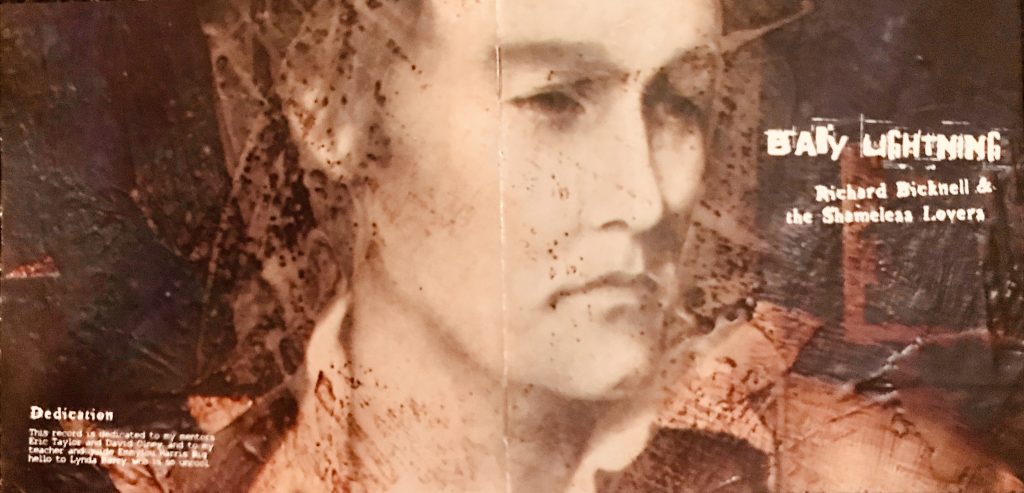
Via a pair of powerful originals on “Baby Lightning,” Bicknell put his queerness openly on stage and invited the world to dance along with him. The song “D.P.L.” is an homage to the Deep Purple Lounge, Columbus, Georgia’s only gay bar back when Bicknell was coming of age there and a place of refuge for LGBTQ+ people. On “Sebastian at The Metro,” meanwhile, Bicknell creates a poetic backstory for his male stripper muse gyrating onstage at the now-late, lamented Midtown Atlanta dive gay bar: “Magnificent dirty south/ I like your dirty mouth/Sebastian dancing at The Metro/A question/Is that your real name/Sebastian?”
To bring “Sebastian at The Metro” to life in the studio, Richard rang up two of his favorite iconic Atlanta singers, Kelly Hogan, who first found fame as the front woman in The Jody Grind and Anne Richmond Boston, the longtime rock goddess voice of The Swimming Pool Q’s.
When asked how in the world he managed to get both women to come in to cut vocals on the track, Bicknell told me, “Well, darlin’, I just asked!”
“Richard was basically out from the day he left high school in 1977 and he never looked back,” remembers Michael Bicknell. “He never tried to hide it. He didn’t have an ounce of shame about being a gay man. ‘D.P.L.’ in my opinion is his best song. It captures the feeling one has in a safe place and how dangerous, unjust and cruel the world can be when one strays too far from that haven.”
After moving my byline over to Atlanta magazine, Bicknell called me one afternoon in the Spring of 2010 to excitedly inform me about a new album he was creating, “Shakedusting Lazarus” and a new A-lister line-up of his backing band, The Shameless Lovers, set to debut at Eddie’s Attic. “I’m so proud of this band and these songs, I wanted to show them off a little while we’re still making the record,” he told me. “These songs just won’t wait.”
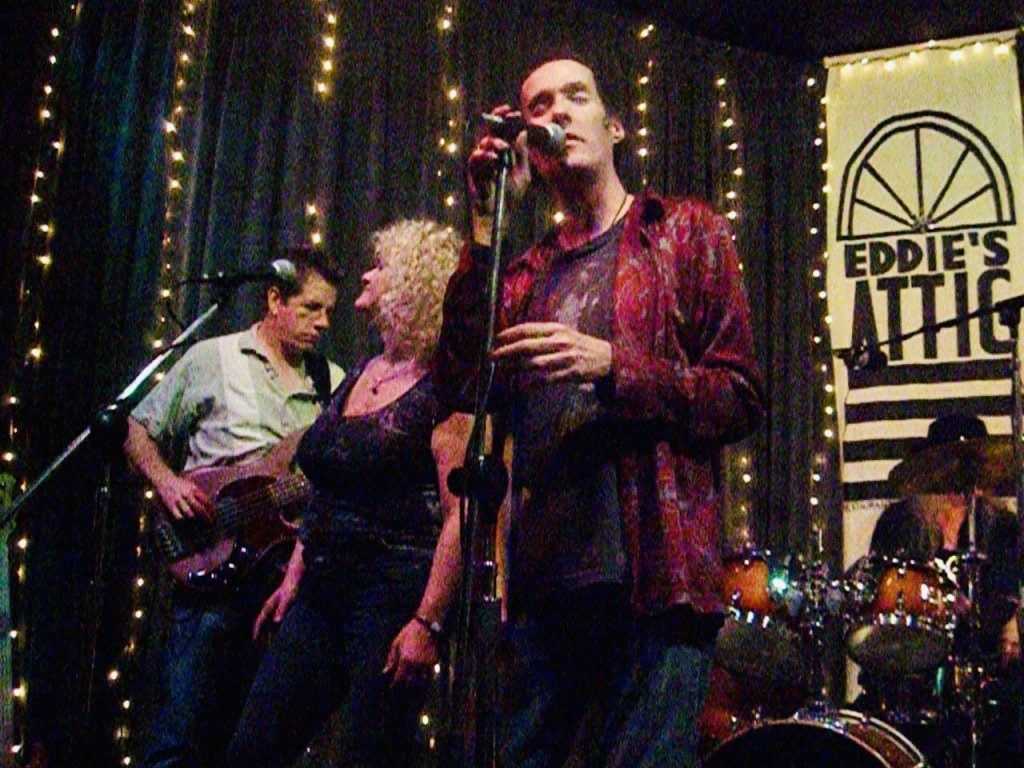
When I gently inquired about the album’s unusual title, Bicknell laughed and conceded, “I just made it up. David Olney told me recently, ‘I suppose you’ve entered that James Joyce phase of your career where you just begin making up words.’ I’m intent on using poor grammar on this album as well. I was so serious for so many years. It’s time to let in a little light.”
The album’s producer and Atlanta music scene veteran Frank French says he worked with Bicknell on the project “for the better part of year.” Unfortunately for fans, due to a lack of funds, “Shakedusting Lazarus” was never released. “That’s sad,” says French. “Because it’s really beautiful.”
The last time I saw Richard was in the summer of 2016. We were both in-the-crowd, off-the-clock music fans there to see Pylon Reenactment Society, featuring original Pylon vocalist Vanessa Briscoe Hay and Anne Richmond Boston with The Swimming Pool Q’s. While he spent much of the evening perched on a stool, every time I glanced over, Bicknell was beaming and singing along with two of his favorite artists.
Between sets, Richard discussed his love for Vanessa and Anne and how lucky he felt as a longtime fan, who, eventually got to perform alongside them as a peer. In a text early Thursday morning, Briscoe Hay returned the compliment: “Richard was a sweet man with a big, deep and rich voice that could fill a room without a mike. I sometimes got a late-night call just to talk. Everyone who ever heard him sing heard his talent. All who knew him knew of his sweet and generous spirit.”
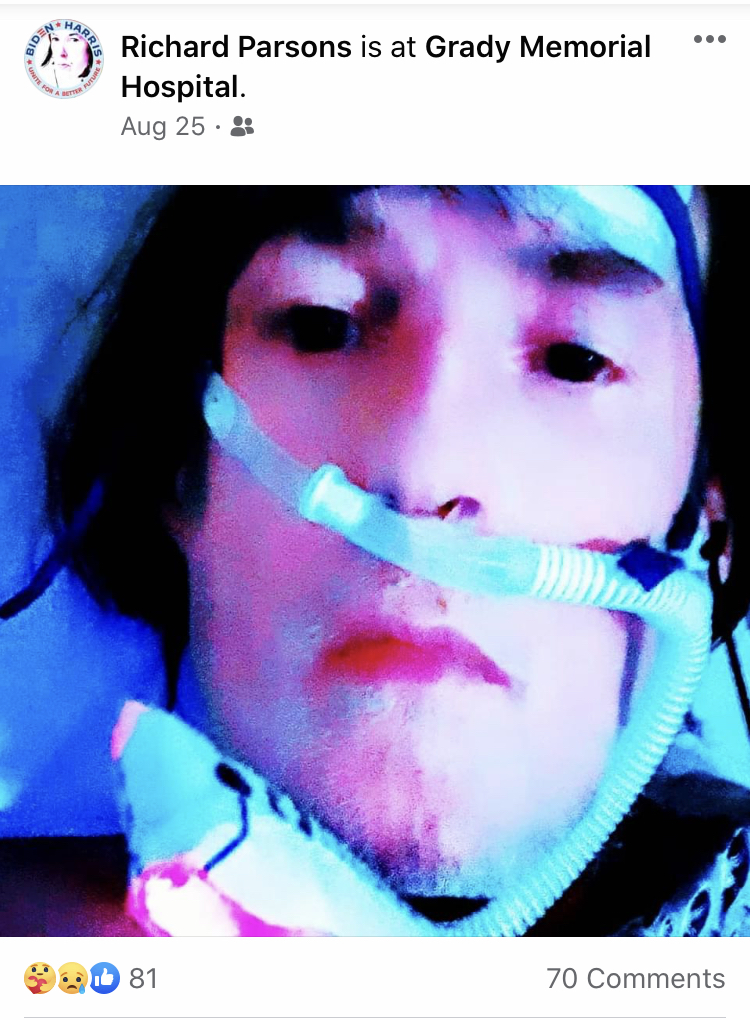
Even during a hospital stay at Grady Hospital last summer, between sips of blueberry smoothies, Bicknell found a way to create art, writing and posting tone poems on his personal Facebook account.
Reflecting on a restorative bath given to him by an ICU nurse, the singer told fans he burst into a rendition of his hero Townes Van Zandt’s “Tecumseh Valley” as he was being dried:
The Way I Pray/I lived vicariously/Today/To find a way/Riding a crest/Of/Mighty suds/Kathleen paved/Composed/Of hot clean/Steaming mean/Water/Soaping over me/To wash/Away/Dark waters/Pouring out of me/Dirty water/Leaving me/Nurse Caroline/Released my voice from/Troughs of/Gargle/And the sweet/Long/Pain released/A version/Necessary/Tecumseh Valley/Long moaning/Come outta me/I sang to my Nurse Caroline/She activated/PAIN/Her deep/Honey hands/Found/Old Sorrows/She set them free/Listen to me/Alone now/In my/Hospital bed/I’m singing/And/I sound good/Something holy/About George Jones/Haggard and Emmy/This is the way/I pray/This is the Way/ I Pray
In the final weeks of his life, Bicknell shared with Facebook fans some of his favorite songs by some of his favorite artists, including Joni Mitchell’s often overlooked 1976 “Hejira” album, calling it “pretty much my favorite record of all time. I think of it as a place I can go to and when I listen, I always listen to it in its entirety. Preferably alone and in the dark.”
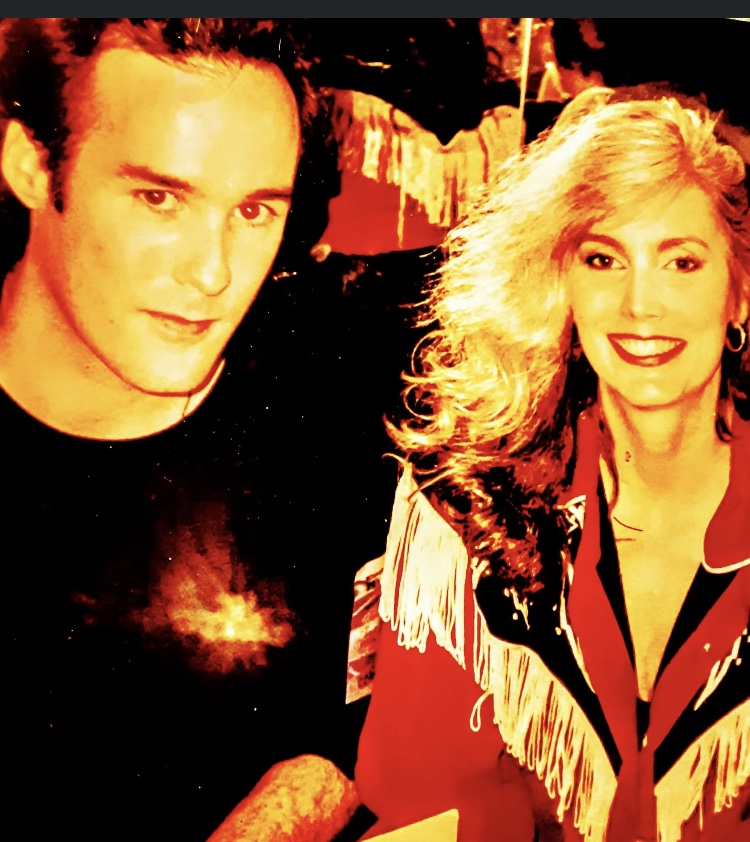
In one of his final notes to fans and friends, accompanying a YouTube video of Nanci Griffith performing her song “Listen to the Radio,” Bicknell wrote in part:
G’night/morning/Gonna sleep now/Thanks to all/Of my Angels/I hear your/Wings fluttering/As you lift me.”
In lieu of flowers, Richard Bicknell has asked that donations be made to Lost-N-Found Youth (lnfy.org), an Atlanta based nonprofit that helps gay, lesbian and transgender homeless youth.

Richard L. Eldredge is the founder and editor in chief of Eldredge ATL. As a reporter for the Atlanta Journal-Constitution and Atlanta magazine, he has covered Atlanta since 1990.

